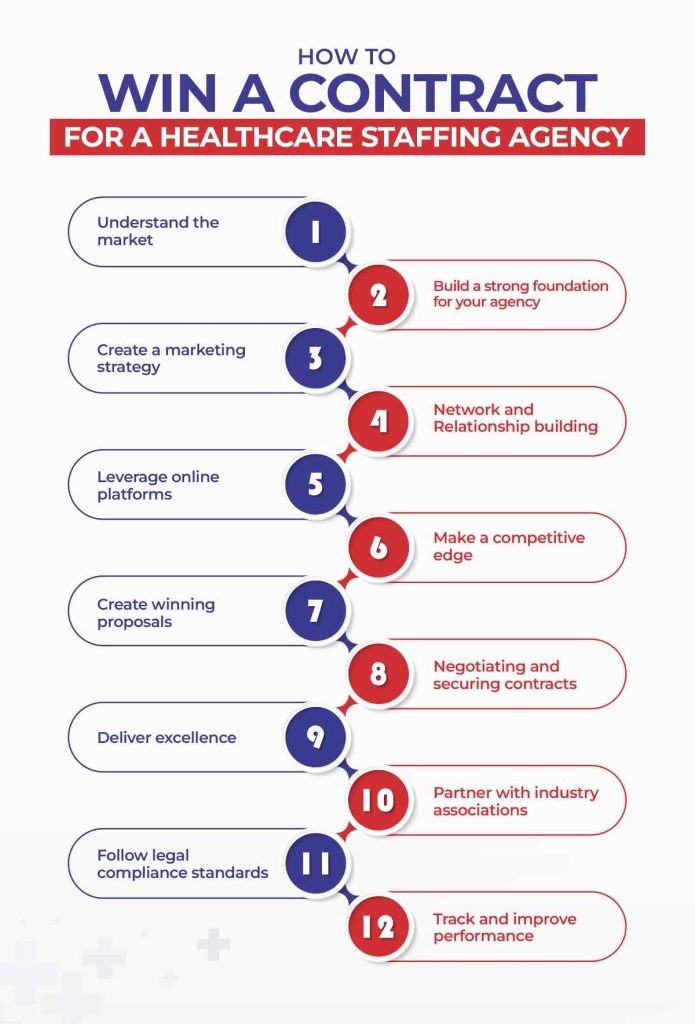The healthcare industry needs qualified professionals now more than ever. Hospitals and clinics face staff shortages across the country. This gap creates big chances for healthcare staffing agencies to grow. Getting contracts is the key to success in this field. New agency owners often struggle to find their first clients. They need a clear path to build a strong business.
This blog will help you understand how to get contracts for healthcare staffing agencies.

How to Win a Contract for a Health Staffing Agency?
Winning contracts takes work and smart planning. First, know what makes your agency special. Then, show this value to potential clients. Build trust through clear talks and honest deals. Show proof of your good work history. Make sure to follow up after meetings. Stay in touch even when deals aren’t happening. Most of all, solve real staffing problems for clients.

1. Understanding the Healthcare Staffing Market
The US healthcare staffing world grows bigger each year. Hospitals need nurses now more than ever before. Clinics search for skilled techs and aides daily. The aging US population drives much of this need. Baby boomers need more care as they get older. Thus, medical jobs will grow 13% by 2031. This rate beats most other job fields.
Many places need staff help right now. Hospitals hire the most healthcare workers by far. Yet other spots need help too. These include nursing homes, rehab centers, clinics, home health, and urgent care staff. Each place has its own special needs. Learn these needs to match your services well.
Big firms and small shops compete in this field. Large groups like AMN Healthcare cover the whole country. Yet local agencies win by knowing their area well. Your firm can stand out by solving local problems. Focus on what makes your service better than others.
2. Building a Strong Foundation for Your Agency
Start by meeting all legal rules in your state. Get the right business license for your work. Buy good insurance to protect your firm. Learn all Joint Commission rules that apply. Set up strong HIPAA plans to guard patient data. Each state has its own staffing laws too.
Next, get top marks that clients trust. The Joint Commission offers a special staffing badge. Join groups like NATHO to show your good standing. The American Staffing Association has a healthcare team too. These groups teach the best ways to run your business.
Choose Your Specialty Area
Don’t try to fill all jobs at once. Pick an area where you can shine. Some firms only staff nurses (RNs, LPNs). Others focus on rehab staff or lab techs. Some work only with doctors or mental health pros. Places like to hire firms that know their exact needs.
3. Creating an Effective Marketing Strategy
Build a clean, easy-to-use website first. Make sure it also works well on cell phones. Clearly list all your staff services. Share stories from happy clients if you have them. Make it easy for new leads to reach you. Write helpful blog posts about staffing issues.
Your brand should stand out from the crowd. Define what makes your agency special. Share your core values and mission clearly. Use the same look and words in all your work. This way, clients start to know and trust you.
Try these paths to reach new clients fast. Use SEO to help clients find your site. Run ads on LinkedIn where hospital leaders spend time. Send useful emails about fixing staff problems. Use Google Ads for quick views of your services. Track what works best for your money.
4. Networking and Relationship Building
Meet people face to face when you can. You can even go to events like these to find clients:
- Hospital group meetings in your state
- Healthcare money management talks
- Local medical group gatherings
- Nursing leader conferences
Always bring cards and a quick pitch about your firm.
Studies show that staffing agencies are gaining importance in work relationships with highly skilled independent contractors. Therefore, join groups where your clients spend their time. For this, state hospital groups are a great start. Even healthcare HR groups help you meet hiring teams. Medical office manager clubs work well too. So, you should join and take part to build trust.
Find the people who make hiring choices:
- Chief Nursing Officers decide on nurse staffing
- HR Directors handle hiring plans
- Unit Managers know their team needs
- Staffing teams run day-to-day fill-ins
Learn their problems first before you try to sell.
5. Leverage Online Platforms
Use job sites made just for healthcare work. Indeed and ZipRecruiter reach many job seekers. LinkedIn helps find higher-level pros. Facebook groups connect with many nurses. Monster and CareerBuilder still work well too.
Social media builds your brand day by day. Share useful tips about healthcare staffing. Post job openings that show your range. Tell stories about staff who found great jobs. Keep posts short, bright, and helpful.
Email still works very well to reach clients. Build a list of leads who want staffing news. Send short, helpful notes once a month. Share tips that make their jobs easier. Track who opens and clicks your links. Follow up with those who show real interest.
6. Create a Competitive Edge
Know what makes your firm better than others. Maybe you should check staff skills more deeply. Perhaps you answer calls faster than others. You might know a special field very well. Find your edge and tell clients about it.
Price matters, but value wins in the end. Don’t be the cheapest, or you’ll lose money. Instead, show why your rates match your worth. Explain the extras that come with your service. Share how you save clients money long-term.
Speed often wins in staffing work. Build a deep bench of pre-checked staff. Use tech to match jobs and staff fast. Create quick ways to check new staff in. Make your whole process faster than others.
Read more: What is the CMS Policy for Locum Tenens?
7. Responding to RFPs and Creating Winning Proposals
Many big health groups use formal bid plans. Find these chances through:
- Government contract sites like SAM.gov
- Hospital group job boards
- RFP alert services for healthcare
- Talks with buying teams
- Calls to places you want to serve
Set up alerts so you see new chances fast.
Traits of Strong Proposals
Strong proposals share these traits:
- Show you get the client’s needs
- Offer clear fixes to stated problems
- Spell out all costs up front
- Share proof of past work
- Include words from happy clients
- Explain backup plans
Make each one fresh, not just a form letter.
Common mistakes to avoid
Don’t make these common RFP mistakes:
- Sending late bids that get tossed out
- Skipping parts of the form
- Giving vague answers
- Sending work with typos or errors
- Pricing too high or too low
- Not fitting the place’s work style
Use a list to check all parts before you send.
8. Negotiating and Securing Contracts
Know all parts of staff deals before you talk:
- How long the deal will last
- How pay rates work
- Fill rate needs
- Rules for job changes
- Who pays for what insurance
- How work gets graded
This helps you feel sure when you talk terms.
Think of deals as fixing problems, not just sales.
- Look for ways both sides can win
- Learn the site’s needs through research
- Listen more than you talk at first
- Try new ways to meet tough needs
- Know your bottom line before you start
- Offer small test runs to show your worth
The best deals help both sides get what they need.
Get legal help to check all your deals:
- Find a lawyer who knows health staffing
- Make sure risk is shared fairly
- Be clear who checks staff credentials
- Spell out all insurance needs
- Plan how to fix any problems
Good legal work stops big problems later.
9. Delivering Excellence and Retaining Clients
Do great work with the clients you have:
- Fill jobs fast with top staff
- Stay in touch all the time
- Fix problems right away
- Share clear reports on your work
- Check in with leaders often
Great work leads to more deals through word of mouth.
Make Final Quality Checks
Set up ways to check your work all the time:
- Make a strong cred check system
- Grade staff work often
- Help staff keep learning
- Ask clients how you’re doing
- Work to keep good staff happy
Share these plans with clients as your edge.
Further, move past just filling jobs for now. You can learn what the site wants long-term. Start with sharing staff planning tips. Plus, tell clients about the trends you see. You should run learning events for their team and celebrating the wins together. As partners get deals renewed while vendors compete.
Read more: Do Staffing Agencies Do Background Checks?
10. Partner with Industry Associations
Join groups that set the rules in staffing:
- The Joint Commission sets care standards
- NATHO works for travel nurse firms
- ASA helps all types of staff firms
- State nurse groups know local needs
- MGMA works with medical office leads
These groups teach the best ways to run your firm.
Health Industry
Look for deals with big health networks:
- Hospital groups often need many staff
- Care networks serve many sites at once
- Big clinics have steady staff needs
- Rehab chains need help in many towns
- Home health groups grow fast now
One big deal can fill your schedule fast. Moreover, work with schools to find new staff:
- Nursing schools have new grads
- Allied health programs train techs
- Medical schools place new doctors
- Meet students before they graduate
- Help new grads find their first jobs
Schools can be a steady source of talent.
11. Follow Legal and Compliance Standards
Stay up to date on all health laws:
- Joint Commission rules change each year
- HIPAA guards patient data rights
- State boards set nurse work rules
- OSHA keeps work sites safe
- Labor laws set pay and hour rules
One missed rule can cost you clients.
Key Rules to Consider
Train your team on all key rules, as well-trained staff have fewer problems. Therefore:
- Make sure all staff know HIPAA well
- Teach proper chart notes and care
- Show how to use health tech right
- Train on ethics in patient care
- Keep all staff skills up to date
Maintain a Complete Record
Keep perfect files on all staff credentials:
- Check and save all state licenses
- Keep skills tests and scores on file
- Save proof of all needed shots
- Run and save all background checks
- Check drug test results twice
Missing credits can shut down your work.
12. Track and Improve Performance
Set clear goals you can measure:
- Track fill rates for all clients
- Count time to fill open jobs
- Watch staff scores from clients
- Track how long staff stay in jobs
- Count leads and deals closed
What gets tracked gets better.
Request for Feedbacks
Ask clients how you’re doing often:
- Send short polls after jobs end
- Call clients to check on staff
- Do full checks once each year
- Ask both bosses and floor staff
- Act on what you learn fast
Feedback helps you fix small issues.
Use what you learn to get better:
- Share wins with your whole team
- Fix weak spots in your process
- Train more on tricky skills
- Try new ways to solve old problems
- Share wins with new leads too
Always work to get a bit better.
Conclusion
Getting contracts for your healthcare staffing agency takes time and hard work. Start with a strong base of rules and trust. Build your brand to stand out from others. Meet the right people who make hire choices. Write strong bids that solve real problems. Most of all, do great work that makes clients want more.
The health staffing field keeps growing each year. Firms that mix good skills with a personal touch win. Start using these tips today to build your client list. Soon your firm will be known as a trusted partner.
Need more help with your health staffing firm? Contact Intuitive Health Services for expert advice. Our team can help you find and win more contracts.

